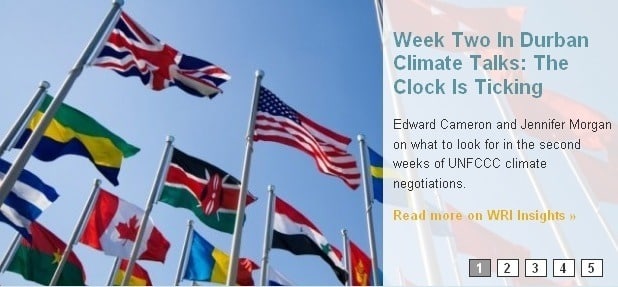Yesterday Willis Eschenbach posted an alarming analysis over at WattsUpWithThat. It suggests that a majority of those attending the international climate summit in Durban aren’t democratically-elected representatives of the public. Instead, they’re professional activists.
Moreover, those activists seem adept at insinuating themselves into national delegations. By Eschenbach’s count, the World Wildlife Fund hasn’t merely sent a delegation of its own to the summit, but 14 more
WWF members [are] masquerading as government delegates.
According to the WattsUpWithThat commenter who goes by the handle ‘eo‘ this is an important point. It means that activists are gaining access to events they’re supposed to be barred from – events that even the media are prevented from attending:
Persons [listed] in the government delegations have [almost] unlimited access to all events. Press, NGOs and even international organizations could not attend the negotiations, participate in the discussions, etc. So it has become a favorite strategy of NGOs to contact friendly government offices to include in the official delegations their own members.
Since reading Eschenbach’s analysis I’ve received, via e-mail, a press release that begins:
After Durban: Building the Climate Change Regime
As COP17 comes to an end, the launch a new paper entitled Building the Climate Change Regime: Survey and Analysis of Approaches on Friday afternoon provides an opportunity to reflect on developments in Durban and to discuss next steps for the global climate change regime. The side event will take place Friday, December 9, 2011, 13:00-15:00 in the EU Pavilion, Room Warsaw. [bold in the orginal]
When activists use the term regime in an earnest, non-ironic manner I get uncomfortable. And just look at how this paper came into being. The press release tells us:
This new paper, written by the World Resources Institute (WRI) and the United Nations Environment Programme (UNEP), with the support of the Government of Ireland.
Its primary author, therefore, is an American activist group – the World Resources Institute. The website of that group currently displays the graphic below while the accompanying text tries to inject some drama by reminding us that the clock is ticking:

The other main author of the paper is a United Nations body. Neither the World Resources Institute nor UNEP are remotely accountable to ordinary people. But that doesn’t stop them from trying to meddle with our lives.
The press release further tells us that a list of speakers will discuss the paper between 1 and 3 pm in the Warsaw Room at the Durban climate summit on Friday. Here’s the list:
- Noel Casserly, Department of the Environment, Community & Local Government, Government of Ireland
- Kaveh Zahedi, United Nations Environment Programme
- Jennifer Morgan & Remi Moncel, World Resources Institute
- John Sweeney, National University of Ireland, Maynooth
- Srinivas Krishnaswamy, Vasudha Foundation India and Climate Action Network International Legal Working Group
All of these people share a particular mindset. Noel Casserly is employed by the Irish environment department. If there were no climate crisis it’s unlikely he would now be spending time in glamorous South Africa. (A brief bio appears at the bottom of p. 14 here.)
Kaveh Zahedi is UNEP’s climate change coordinator. If there were no climate crisis, his cushy, Paris-based job would promptly vanish.
Jennifer Morgan may work for the World Resources Institute now, but she used to be the WWF’s chief climate change spokesperson. She, too, earns a fine living off the climate crisis. (As a bonus, she’s now helping to prepare the Intergovernmental Panel on Climate Change’s utterly objective, impeccably neutral upcoming report.)
Morgan’s colleague, Remi Moncel, would also be looking for work if there were no climate crisis. His bio here (backup link here) makes it clear that his professional life is devoted to promoting “collective climate action.”
And then there’s John Sweeney, an Irish academic who served as a contributing author, review editor, and expert reviewer for the last climate bible. He’s also one of those 78 IPCC personnel who’ve publicly aligned themselves with the WWF.
Sweeney has been called “Ireland’s most senior climate expert” (backup link here). Where, exactly, would his career be without a climate crisis?
Finally, those who attend the meeting in Durban will hear from Srinivas Krishnaswamy. He used to head Greenpeace India’s climate and energy campaign. As a current spokesperson for the Climate Action Network, he managed to get himself quoted in one of Canada’s national newspapers this week. What he’d be doing with his time if there were no climate crisis is uncertain – but it’s far from clear that the media would be paying him the slightest attention.
In other words, there is now a small – perhaps even middling-sized – army of people around the world whose economic lives depend on the rest of us believing that climate catastrophe is just around the corner. If we were to liberate ourselves from climate fear and anxiety they’d all be out of work. Their travel to exotic places, their moments in the media spotlight – and a significant portion of their self-identities – would all disappear.
So these people have no choice but to continue onward. They will keep holding meetings and will keep writing papers that attempt to convince the rest of us that a climate regime is necessary.
One day – but evidently not quite yet – they’ll get a real job.
Info similar to that contained in the press release appears in the yellow box here.





